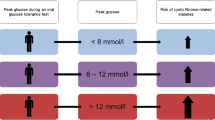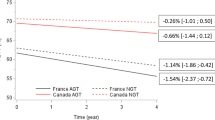Abstract
Diabetes mellitus is an increasing complication of cystic fibrosis (CF), as a result of the improved life expectancy. There is clear association between diabetes and increased morbidity and mortality. Lung function and clinical status deteriorate up to 2–4 yr before the diagnosis of cystic fibrosis-related diabetes (CFRD). The aim of our study was to evaluate the effects, on glucose homeostasis and clinical status, of the early treatment with insulin glargine in CF patients with impaired glucose tolerance (IGT). We selected six subjects with IGT diagnosed at oral glucose tolerance test (OGTT). Median age was 18.12 yr (range 9.2–27.8). Insulin glargine was administered at the median dosage of 0.3 U/kg/day (range 0.2–0.5). After the initial adjustment of the dosage, no patient manifested hypoglycemia during treatment. Median glycosylated hemoglobin (HbAIc) did not show any significant variation during treatment: it was 5.9% at baseline (range 5.5–6.2) and 6.1% (range 5.0–6.7) at the end of follow-up (p = 0.496). Median body mass index (BMI) z-score significantly increased during treatment, from −0.95 (range −3.2–+0.6) at baseline to −0.5. (range −3.0–+0.9) at the end of follow-up (p = 0.026). Lung function, measured by median forced expiratory volume in the first second (FEV1%), showed a mild but significant improvement during insulin treatment. It was 72.7% at baseline (range 41.5–98.4) and 76.7% (range 42.0–106.8) at the end of follow-up (p = 0.027). No significant variation was found between the number of hospitalizations for clinical exacerbation (no./patient/yr) in the last 2 yr before treatment and during follow-up. Median number at baseline was 1.95/patient/yr (range 1–3) and 2.0/patient/yr (range 1–3) at follow-up (p = 0.715). Our data seem to indicate that early insulin therapy can be safe, no patient manifested hypoglycemia or other adverse effects during treatment. Insulin is an anabolic hormone implicated in both lipid and protein metabolism. The appearance of IGT out of infections can indicate an early insulin deficiency, with a potential impact on the nutritional and clinical status of the patient, even before the appearance of overt diabetes. Larger controlled trials are necessary to verify if early insulin therapy is able to reduce the deterioration of nutritional status and lung function associated with the onset of IGT. (J. Endocrinol. Invest. 29: RC1-RC4, 2006)
Similar content being viewed by others
References
Brennan AL, Geddes DM, Gyi KM, Baker EH. Clinical importance of cystic fibrosis related diabetes. J Cyst Fibros 2004, 3: 209–22.
Moran A, Diem P, Klein DJ, Levitt MD, Robertson RP. Pancreatic endocrine function in cystic fibrosis. J Pediatr 1991, 118:715–23.
Moran A, Pyzdrowski KL, Weinreb J, et al. Insulin sensitivity in cystic fibrosis. Diabetes 1994, 43: 1020–26.
Milla CE, Warwick WJ, Moran A. Trends in pulmonary function in patients with cystic fibrosis correlate with the degree of glucose intolerance at baseline. Am J Respir Crit Care Med 2000, 162: 891–5.
Nousia-Arvanitakis S, Galli-Tsinopoulou A, Karamouzis M. Insulin improves clinical status of patients with cystic-fibrosis-related diabetes mellitus. Acta Paediatr 2001, 90: 515–9.
Rolon MA, Benali K, Munck A, et al. Cystic fibrosis-related diabetes mellitus: clinical impact of prediabetes and effects of insulin therapy. Acta Paediatr 2001, 90: 860–7.
Management of Cystic Fibrosis Related Diabetes Mellitus — Report of the UK Cystic fibrosis Trust Diabetes Working Group -June 2004.
Moran A, Milla C, Ducret R, Nair KS. Protein metabolism in clinically stable adult cystic fibrosis patients with abnormal glucose tolerance. Diabetes 2001, 50: 1336–43.
Rafii M, Chapman K, Stewart C, et al. Changes in response to insulin and the effects of varying glucose tolerance on whole-body protein metabolism in patients with cystic fibrosis. Am J Clin Nutr 2005, 81: 421–6.
Dobson L, Hattersley T, Tiley S, Elworthy S, Oades Pj, Sheldon CD. Clinical improvement in cystic fibrosis with early insulin treatment. Arch Dis Child 2002, 87: 430–1.
Author information
Authors and Affiliations
Corresponding author
Rights and permissions
About this article
Cite this article
Bizzarri, C., Lucidi, V., Ciampalini, P. et al. Clinical effects of early treatment with insulin glargine in patients with cystic fibrosis and impaired glucose tolerance. J Endocrinol Invest 29, RC1–RC4 (2006). https://doi.org/10.1007/BF03345538
Accepted:
Published:
Issue Date:
DOI: https://doi.org/10.1007/BF03345538




